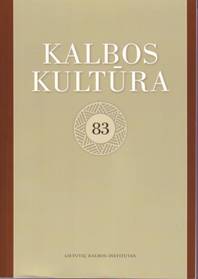Kitų kalbų tikrinių vardų rašymo probleminiai atvejai latvių kalboje
Problematic cases of rendering borrowed proper names into Latvian
Author(s): Dzintra ŠulceSubject(s): Baltic Languages
Published by: Lietuvių Kalbos Institutas
Summary/Abstract: Problematic character of spelling and pronunciation of proper names becomes apparent in all languages, including Latvian, a cognate language of Lithuanian. Difficulties arise both when words of Latvian origin are used in another language and when rendering borrowed proper names into Latvian.Scientifically based principles of rendering borrowed proper names into Latvian were defined in the second half of the 19th century. These principles bear a sufficiently universal character and they have preserved their topicality even nowadays. Borrowed proper names still follow the pronunciation rules of the original language, only letters of the Latvian alphabet are used in their spelling, and the rendered proper names are included into the Latvian grammar system.Language history shows that early borrowed personal names were localised and translated into Latvian. It means adjustment of literary and folklore pieces, historic events, personalities etc. to the singularity of the given nation, of the country and specific character of perception.When proper names of the original language are not written in Latin letters, they are transliterated in Latvian. The spelling of the borrowed proper names in Latvian, taken as a whole, is fixed and complies with the rules; however, deviations from the pronunciation principle become more frequent, especially in cases of personal names of foreign origin.Mistakes, inaccuracies and deviations from the original version of proper names can be caused by the influence of other languages. For quite a long time, Russian was used as an intermediary language; nowadays new problems arise from the strong infatuation with English versions.Latvialisation of borrowed proper names according to their pronunciation, with the original form enclosed in brackets, is mentioned as the most optimal principle of rendering borrowed proper names. In such cases this will certainly bring most benefit to the reader, for whom the text might become easier to perceive. With contacts between countries and languages developing, in practice more attention is given to the original spelling of proper names.
Journal: Bendrinė kalba (iki 2014 metų – Kalbos kultūra)
- Issue Year: 2010
- Issue No: 83
- Page Range: 222-228
- Page Count: 7
- Language: Lithuanian

